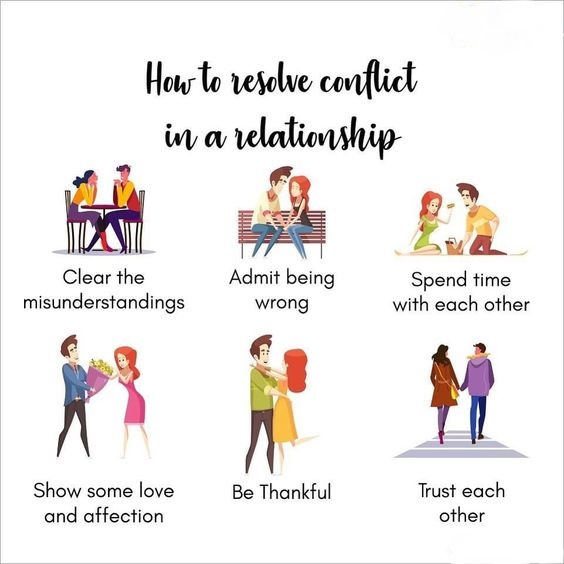Managing Conflicts In Relationship: Effective Communication Tips

Relationships can be tough to handle sometimes due to conflicts. Indeed, conflicts bring sourness to the relationship. Everyone is not trained to manage conflicts so that no one gets hurt.
However, when you apply, “nobody is perfect” and “learn from your mistakes” type phrases together…it might help you to maintain your relationship. Other than this, there are various ways that help you to manage conflicts in a relationship positively. Want to know effective communication tips?
Keep reading till the end.
Conflicts in a Relationship:

Any type of disagreement or confusion is the main cause of conflicts in a relationship. Conflicts bring stress to the relationship, they also impact the quality of life. According to my opinion, communication is the most effective key to dissolve any type of conflict in a relationship.
Apart from stress, conflicts also make us angrier and that anger results in something worse than we can ever imagine. And later it results in regret. Disagreements and conflicts in a relationship instantly escalate mishappenings that make the relationship sour.
Also Read: Warning Signs of Emotional Abuse in Relationships!
Indeed, conflicts are unpleasant and stressful.
Effective Strategies to Deal with Conflicts in a Relationship
1. Create A Welcoming Environment.
When you wish to keep a healthy relationship, you and your spouse should communicate everything openly about your insecurities and what is going off track in your relationship. It is not essential that you guys only talk about your issues or your relationship; you can also talk about positive things that have happened between you both.
You can also appreciate the best things about your partner so that you and your partner can become more stable for having a conversation related to the issues. You can openly talk about aspirations, financial issues, life issues, or other issues that are troubling you or your relationship. If you are not able to express your thoughts, do not get overly defensive or upset and do not end up in an abusive situation.

2. Maintain A Respectful And Calm Demeanor
First of all, do not ever cross lines or start blaming your partner, or insulting your partner. Maintain your focus on resolving the dispute, instead of going deeper into your personal issues. Do not ever bring money issues into the fight; do not become aggressive or cursing. Try to maintain a calm and respectful demeanor.
Additionally, do not make your partner angrier about the things they might have done in the past. Do not cultivate old roots in a new relationship. Don’t become so toxic that your partner starts thinking to end the relationship.
3. Understand The Root Cause
The only reason behind arguments or disagreements with your partner is the absence of meeting the needs. Therefore, take a moment and try to evaluate whether it’s okay or not. If your partner is watering small stuff, make sure it does not grow bigger. Make sure you re-evaluate everything related to the disagreement before replying back to your partner.
Also, consider if your partner’s point is valid or not. If it’s valid, acknowledge it calmly and try to maintain a positive environment around the home. If it’s invalid, it happened due to miscommunication, therefore, try to calm your partner and make him\her understand.
4. Understand When to Control, When To Refuse, and When To Reply Back
Sometimes, we try to control what is uncontrollable, and sometimes we tend to reply back when we should stay quiet. Therefore, after understanding the root cause of the problem, evaluate if it’s the right time to speak, refuse, or control.
Remember, you’re the one who can make your relationship stronger or can break it in a second. Think wisely, act wisely, and reply back wisely. As per my suggestion, knowing when to react is the main key to manage conflicts in a relationship.
If in case, it seems that your relationship has become abusive, seek professional help like marriage counseling or family counseling. To connect with a certified marriage counselor from BetterHelp, click here.
5. Try To Maintain A Balance
Finding a middle-ground wherein you both are comfortable and balanced is really essential when you want to make it work. If you both will understand the root cause, you both might be able to agree on those parts which were difficult to understand.
Compromising and adjusting are other key secrets to a successful marriage and resolving conflicts. Therefore, try to find a middle ground and try to communicate so that you both can come back on the right track.
If you think your partner is always partying with his friends, you might need a conversation wherein you have to find a middle ground. Remember; avoid blame-game as it may lead to consequences.
6. Try to Reevaluate And Do Not Hide Your Faults
Sometimes, it is better to evaluate if it is worth fighting for or is it worth arguing for. Sometimes, it is better to accept our faults; sometimes it is better to lose a battle to save a relationship. If the issue is really small, it is never worth the time.
You should be better at focusing on your dream plans or growth. I am not asking you to give up on yourself, it’s just I am asking you to reevaluate and think on your own if it’s really worth doing this. If you feel you’re wrong, acknowledge it, and find a middle-ground so that the conflicts can be resolved.
7. Control What is Controllable
A positive argument with your partner about something major is okay. But, arguing over small things is kind of weird and unapologetically invalid. If you really want your relationship to work, you guys should be seeing an eye-to-eye bigger vision. Having goals, dreams, and beliefs in alignment is the secret to a successful marriage.
These tips are surely going to help you to manage conflicts in your relationship in a constructive and healthy manner. Scroll down to read and apply 12 steps of a healthy argument resolution cycle.
12 Steps of Healthy Resolution Cycle
1. Think
Whenever you feel any heated argument is going to happen, think about the time when you both had a conflict and how it turned into anger. Try to recognize how upset you were after that incident and how long it took to get things back on track. Now, share this realization with your partner.
2. Notice
During the time of disagreement, try to recognize the reason behind rational thinking. Do not blame, try to maintain calm.
3. Stop
Notice if you or your partner are becoming too stressed or upset after the incident, if they actually are…try to stop the conversation, pick a time, calm down the moment, and try to talk later.
4. Pick
Once you or your partner have picked up the time, try to be there, prepared to listen, pick up from where you left the conversation.
5. Write
In case, you guys have decided to take a break from each other, make sure you’re writing your thoughts and feelings in a journal.
6. Identify
After journaling your emotions, take some time to reread the thoughts and try to identify the root cause of the disagreement.
7. Interact and resolve
Once you’ve recognized the root cause, try to resolve the conflict by taking responsibility for your actions and behaviors that caused the heat at the moment.
8. Share
Do not blame, try to resolve the fight or conflict while expressing your emotions. Do not use the term “you”, instead use “we”. Stand up for your relationship and resolve it calmly.
9. Acknowledge
Acknowledging your faults is not a sign of weakness. Therefore, be responsible for your actions and validate the disagreement peacefully.
10 Empathy
Don’t be so harsh on yourself or your partner, try to understand the situation from both sides and try to figure out a mutual resolution.
11. Resolve
After sharing emotions and practicing empathy, try to acknowledge and validate each other. Try to resolve the conflict and promise each other to maintain the understanding.
12. Smile
After resolving, bring a big smile on each other’s face and promise not to hurt each other again.
Brownie Tips for Managing Disagreements:
1. Remember that it takes time to learn and master a healthy resolution cycle.
2. It might take a little more time to reach step 12.
3. If you’re getting stuck somewhere in the middle, seek professional help. To connect with a mental health expert from BetterHelp, click here.
4. Don’t be harsh on yourself; give yourself time to overcome the obstacles.
I hope this blog helps you to manage conflicts and disagreements in your relationship. Comment down and let us know what you generally do to make your relationship healthy. For more such motivational content, follow Calm Sage on all social media platforms.
Thanks for reading.
More power to you!
Next Read:
5 Effective Ways To Deal With A Toxic Marriage
8 Types of Love | Learn their Impact on Your Relationships
Modern Dating and Relationship Issues: Therapy for Relationships
Anxiety In Codependent Relationships | Ways To Cope
7 Keys To Building Stronger and Better Relationships in Your Life




















